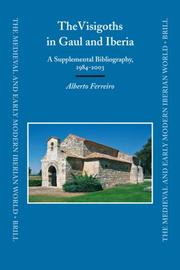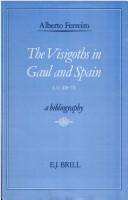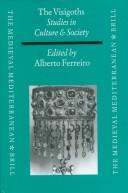| Listing 1 - 4 of 4 |
Sort by
|
Book
Year: 1922 Publisher: Uppsala : Almqvist & Wiksells boktr.,
Abstract | Keywords | Export | Availability | Bookmark
 Loading...
Loading...Choose an application
- Reference Manager
- EndNote
- RefWorks (Direct export to RefWorks)
Fibulae. --- Fibulas (Jewelry). --- Franken (volk). --- Franks. --- Volksverhuizing. --- West-Goten.

ISBN: 900414594X 9789004145948 9786611396725 1281396729 9047408187 9789047408185 6611396721 9781281396723 Year: 2006 Volume: 28 Publisher: Leiden [etc.] Brill
Abstract | Keywords | Export | Availability | Bookmark
 Loading...
Loading...Choose an application
- Reference Manager
- EndNote
- RefWorks (Direct export to RefWorks)
The bibliography includes material published from 1984 to 2003. The historical chronology has been expanded to include the fourth century. This includes unlike the first one Iberian Fathers such as Gregory of Elvira, Potamius of Lisboa, Prudentius, and Pacian of Barcelona. As with the first bibliography (Brill, 1988) among the many topics represented are: Archaeology, Liturgy, Monasticism, Iberian-Gallic Patristics, Paleography, Linguistics, Germanic and Muslim Invasions, and more. In addition, peoples such as the Vandals, Sueves, Basques, Alans and Byzantines are included. The book contains author and subject indexes and is extensively cross-indexed for easy consultation. A periodicals index of hundreds of journals accompanies the volume. This collection of nearly 8,000 entries is an attempt to bring up-to-date the scholarship on Iberia and Gaul in Late Antiquity.
Visigoths --- Wisigoths --- Bibliography. --- Bibliographie --- Visigoths. --- West-Goten. --- Westgoten. --- Westgotenreich. --- Geschichte --- France. --- Spain. --- Gallië. --- Iberisch schiereiland. --- Gallien. --- Spanien. --- Geschichte. --- West Goths --- Goths

ISBN: 9004087931 9789004087934 9004621644 Year: 1988 Publisher: Leiden: Brill,
Abstract | Keywords | Export | Availability | Bookmark
 Loading...
Loading...Choose an application
- Reference Manager
- EndNote
- RefWorks (Direct export to RefWorks)
Visigoths --- Wisigoths --- Bibliography --- Bibliographie --- -Visigoths --- -#GROL:SEMI-27<01> '04/07' --- West Goths --- Goths --- Visigoths. --- West-Goten. --- Bibliographie. --- France --- Spain --- France. --- Spain. --- Bibliography. --- #GROL:SEMI-27<01> '04/07' --- Visigoths - France - Bibliography --- Visigoths - Spain - Bibliography

ISBN: 9004112065 9789004112063 9789004474581 9004474587 Year: 1999 Volume: 20 Publisher: Leiden: Brill,
Abstract | Keywords | Export | Availability | Bookmark
 Loading...
Loading...Choose an application
- Reference Manager
- EndNote
- RefWorks (Direct export to RefWorks)
The study of the Visigoths continues to be one of the most actively researched topics in Late Antique Studies. As might be expected the vast majority of the work has been carried out in Europe and especially by scholars from the Iberian Peninsula. There has always been a need, however, to make much of this research accessible to English language specialists and the wider academic community in Late Antiquity Studies. Too often Late Antiquity Studies tend to ignore or marginalize the Iberian Peninsula and this may be due in part to the lack of access to this scholarship in the English language. This volume of essays has as one of its goals to ameliorate such a deficiency. The scholars who participated in this volume are both from Europe and North America. They also represent scholars who are well known and those who are establishing distinguished scholarly reputations. Although thematically the essays do not exhaust the broad nature of Visigothic studies, they do nevertheless offer an impressive array of topics. Coverage includes research on Visigothic identity in Gaul, regional studies on Galicia and Lusitania, anti-Semitism in Visigothic law, the political grammar of Ildephonsus of Toledo, monasticism and liturgy, numismatics, Roman-Visigothic pottery in Baetica, urban and rural archaeology, and Gothic consciousness among Mozarab communities.
Visigoths --- Suevi (Germanic people) --- Wisigoths --- Suèves --- Suevi (Germanic people). --- Visigoths. --- West-Goten. --- France. --- Portugal. --- Spain. --- Suèves --- Spain --- Portugal --- France --- Visigoths in Spain --- Suebi (Germanic people) --- Suevi --- Suevians (Germanic people) --- Ethnology --- Germanic peoples --- Swabians --- Visigoths - Spain. --- Suevi (Germanic people) - Portugal. --- Visigoths - France.
| Listing 1 - 4 of 4 |
Sort by
|

 Search
Search Feedback
Feedback About UniCat
About UniCat  Help
Help News
News